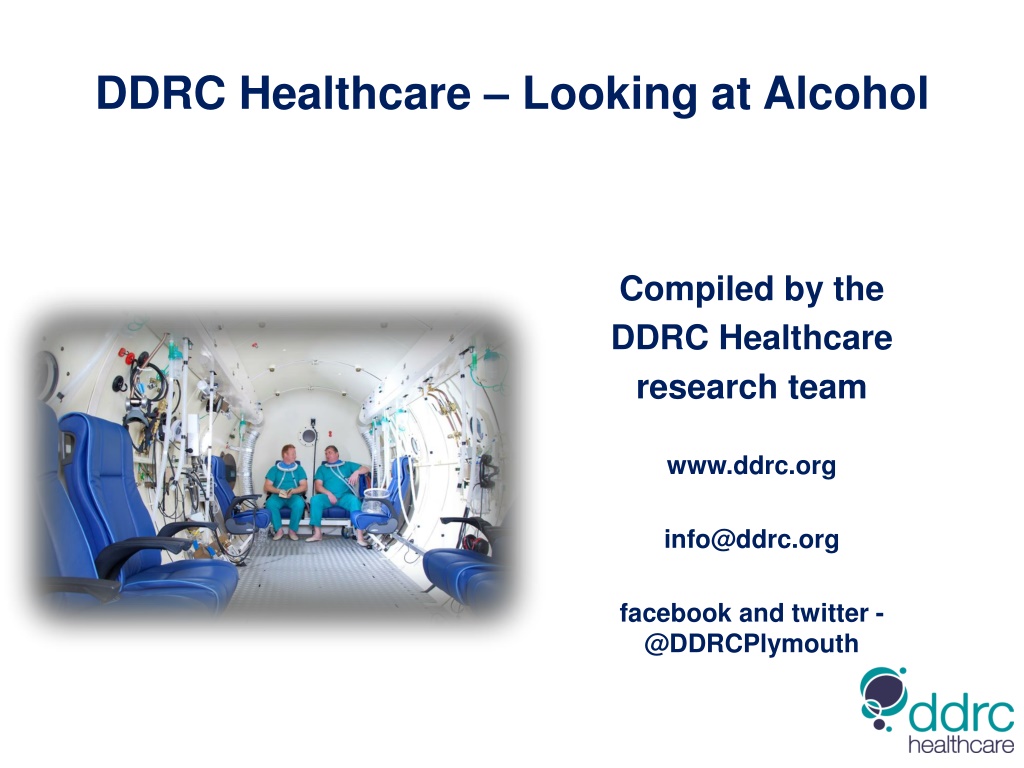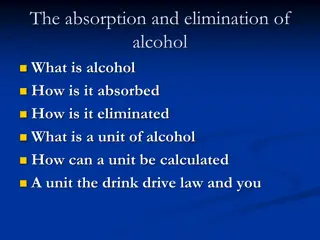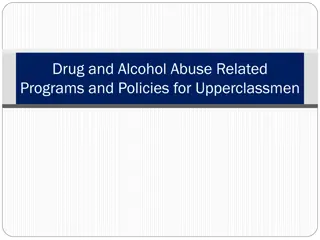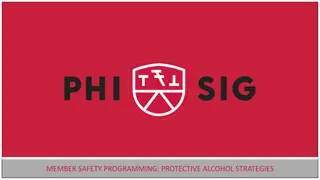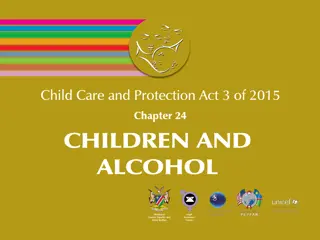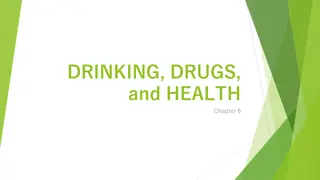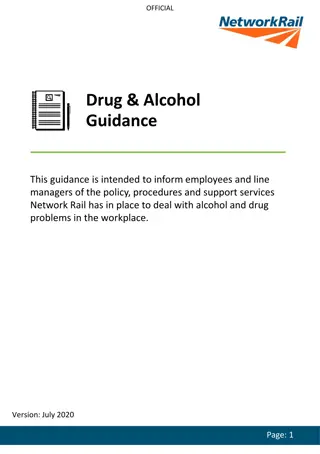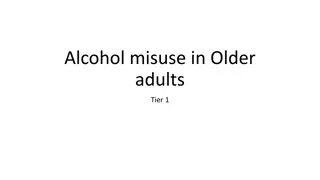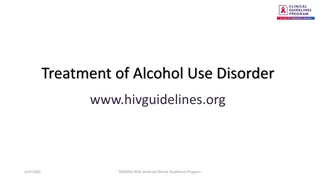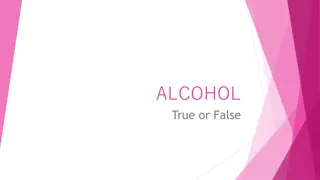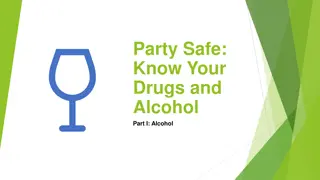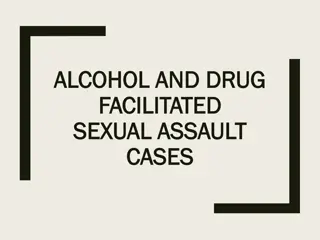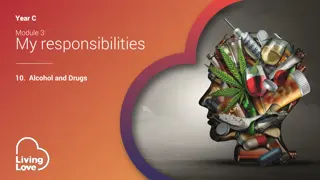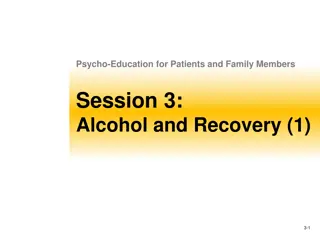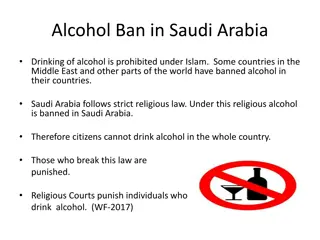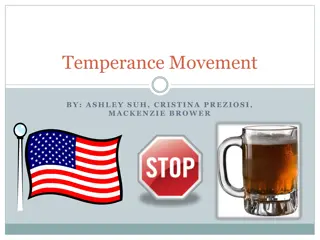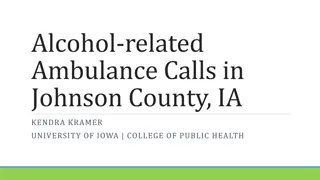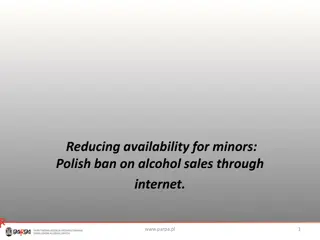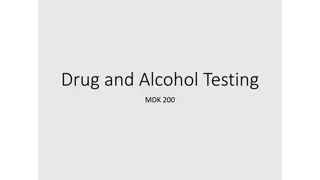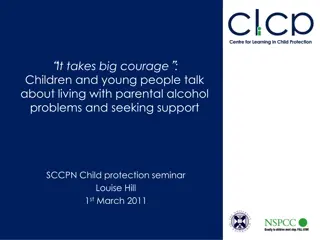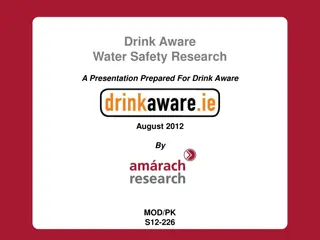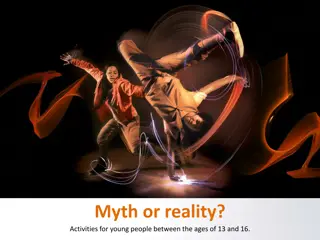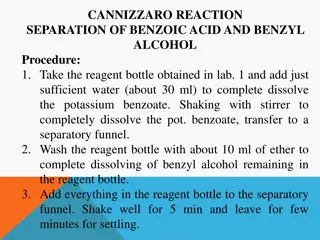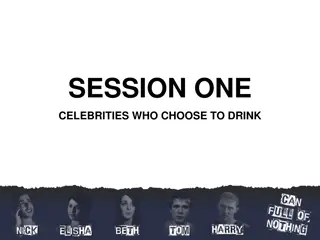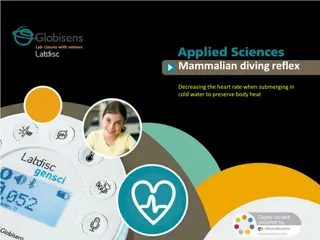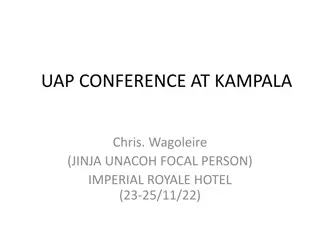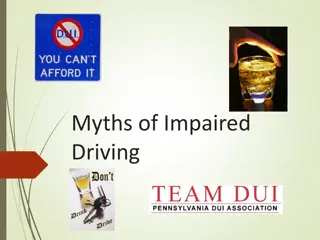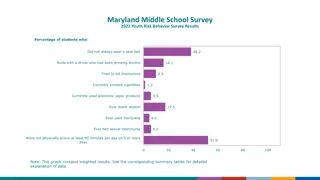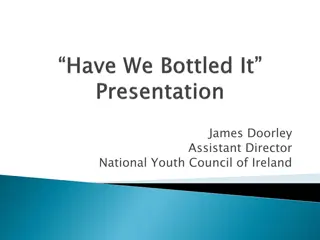Understanding Alcohol and Diving: Important Facts and Guidelines
Explore the relationship between alcohol consumption and diving, including key information on units, ABV, BAC, guidelines, and factors affecting alcohol absorption. Learn about the impact of gender and ethnicity on alcohol tolerance and dive safety.
Download Presentation

Please find below an Image/Link to download the presentation.
The content on the website is provided AS IS for your information and personal use only. It may not be sold, licensed, or shared on other websites without obtaining consent from the author. Download presentation by click this link. If you encounter any issues during the download, it is possible that the publisher has removed the file from their server.
E N D
Presentation Transcript
DDRC Healthcare Looking at Alcohol Compiled by the DDRC Healthcare research team www.ddrc.org info@ddrc.org facebook and twitter - @DDRCPlymouth
Whats this talk all about? Alcohol and diving What you should know about alcohol the basics What are units, AbV and BAC? Real life research data about divers and alcohol The alcohol hangover and diving Diving when you are unfit to drive a car?
Alcohol and Diving Size does matter, so does strength, and so does gender! What s in a glass? How strong is it? Is it good for you?
Alcohol and Diving The current UK guidelines, since 2016, advise that: Alcohol intake should be no more than 14 units a week for both women and men This is equivalent to drinking no more than 6 pints of average-strength beer (4% ABV) or 7 medium- sized glasses of wine (175ml, 12% ABV) a week
Alcohol and Diving What is a unit? Wine (AbV) 125ml (small glass) 175ml (standard glass) 250ml (large glass) One bottle 12% 1.5 units 2.1 units 3 units 9 units 14% 1.75 units 2.45 units 4 units 11 units Beer (AbV) Half Pint 1 Pint 4% 1.1 units 2.3 units 5% 1.4 units 2.8 units Cider (AbV) Half Pint 1 Pint 7% 2 units 4 units Spirits (AbV) 25ml (single) 50ml (double) 40% 1 unit 2 units Sherry (AbV) 100ml 20% http://www.britishlivertrust.org.uk/home/looking-after-your-liver/alcohol.aspx 2 units
Alcohol and Diving Does a specific number of units affect everyone the same way? How the number of units of alcohol relates to a person s blood alcohol volume (BAC) depends on many factors Food, and carbonation of drink, effect speed at which alcohol is absorbed into blood stream Food slows it down, carbonation speeds it up
Alcohol and Diving Does a specific number of units affect everyone the same way? Gender also plays a role, with the average woman having a lower alcohol tolerance than the average man Ethnicity also plays a role, with men and women of European descent tolerating alcohol better than Aboriginal Australians, Native Americans and some East Asian groups
Alcohol and Diving What is BAC? Blood alcohol content (BAC) Why do we want to know the BAC? To measure intoxication for medical and legal purposes For example drink driving What is the UK legal drink drive BAC? 80mg of alcohol per 100ml of blood in England, Wales & N Ireland 50mg of alcohol per 100ml of blood in Scotland
Alcohol and Diving What is AbV? AbV means Alcohol by Volume It is not only the size of the drink, but how much alcohol it contains 15% AbV means when calculated, that 15% of the volume is pure alcohol And for those with a mathematical brain who want to know more
Alcohol and Diving What does alcohol do to us?! Alcohol affects the ability to organize, orientate, and concentrate Judgment, decision making, mood and visual accuracy are impaired Dehydration risk for DCI Hangover can effect cognitive function and ability to function safely All are a contra-indication to safe diving
DDRC Healthcare research data Alcohol and Diving Research results DDRC Healthcare research looked at the alcohol habits of divers Over 800 divers, with an age range of 17 to 74 provided information
DDRC Healthcare research data Alcohol and Diving Research results 34.5% divers admitted to consuming alcohol between six hours and less than 30 minutes before a dive 39.78% of that group admitted they had gone diving when unfit to drive a car 16 divers reported they had consumed alcohol less than 30 minutes before a dive - 18.46% of the whole study group said they had gone diving when unfit to drive a car 7% were technical divers
DDRC Healthcare research data Alcohol and Diving Research results Younger divers were more likely to binge drink* Older divers were more likely to exceed the recommended weekly amount of units as age increased Some divers had attended hospital for drink related accidents broken bones, concussion, car crash A small number of divers admitted to alcohol health related problems *Binge drinking is defined as drinking more than double the daily recommended units of alcohol in one session
DDRC Healthcare research data Alcohol and Diving Research results 22.86% divers said they had witnessed a diving incident that they considered might be alcohol related Diving incidents due to excessive alcohol consumption, where divers were still drunk the morning after which also included instructors A fatal incident where a lot of alcohol had been consumed the night before a deep dive course
DDRC Healthcare research data Alcohol and Diving Research results More diving incidents with possible alcohol links Divers sinking a couple of pints at lunchtime in between dives A group diving with hangovers on a shallow dive; all over the place, and vomiting on return to surface
DDRC Healthcare research data Alcohol and Diving Research results Only 54% of the respondents thought that their club/fellow divers had a responsible attitude to alcohol and diving around a normal club diving situation Less than 40% of respondents thought their club/fellow divers had a responsible attitude to diving when on a diving holiday or a diving week-end away
DDRC Healthcare research data Alcohol and Diving More DDRC Healthcare data to think about: Divers treated for DCI at DDRC 2018 71% consumed alcohol within 24 hours 2019 100% consumed alcohol within 24 hours In a separate DDRC study in 2019 16% of >600 technical divers had gone diving when they were unfit to drive a car
DDRC Healthcare research data Alcohol and Diving In summary How the number of units of alcohol relates to a person s blood alcohol volume (BAC) depends on many different factors Alcohol not only causes dehydration, but affects the ability to organize, orientate, concentrate, and react to an incident; judgment, decision making, mood and visual accuracy are also impaired Hangover can also effect cognitive function and ability to function safely
DDRC research data Alcohol and Diving In summary 18.46% of divers had dived when unfit to drive a car 34.5% divers consumed alcohol between six hours and less than 30 minutes before a dive 22.86% divers said they had witnessed a diving incident that they considered might be alcohol related Next time you drink alcohol think when you will next go diving Next time you go diving think when you last consumed alcohol
Alcohol and Diving Web-sites with more information https://alcoholeducationtrust.org/teacher-area/facts-figures https://alcoholchange.org.uk
Who and what is DDRC Healthcare? Emergency recompression Education Fitness to dive advice Research Training Wound Care Medicals Building the future
